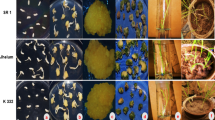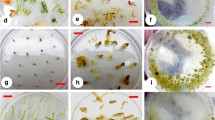Abstract
Significant efforts are being directed towards the improvement of rice using genetic manipulations. A good and reproducible system for recovering fertile Indica rice plants is imperative. The aim of this study was to study the influence of initial cell density on growth dynamics of suspension cultures. The cultures were initiated from 3-week-old embryogenic calli derived from mature seeds of Indica rice cultivars ASD16 and Pusa basmati. Growth kinetics of the rice cell suspensions were measured and the obtained data reveal that viable cells at 3% PCV using 20 ml liquid (N6D) medium and sub-culturing at 7-day intervals resulted in rapid increase in fresh and dry weights and the embryogenic competency of the cells were found to be high. The growth kinetics analysis revealed that ASD16 showed better efficiency for high frequency and viable somatic embryo formation as compared to Pusa basmati. The technique was found to be suitable for developing somatic embryos for both cultivars ASD16 and Pusa basmati, which can be used for many important applications including micropropagation and secondary metabolites production.








Similar content being viewed by others
References
Biswas GG, Iglesias VA, Datta SK, Potrykus I (1994) Transgenic Indica rice (Oryza sativa L.) plants obtained by direct gene transfer to protoplasts. J Biotechnol 32(1):1–10
Christou P, Ford TL, Kofron M (1991) Production of transgenic rice (Oryza sativa L.) plants from agronomically important indica and japonica varieties via electric discharge particle acceleration of exogenous DNA into immature zygotic embryos. Nat Biotechnol 9(10):957–962
Chu CC (1978) The N6 medium and its applications to anther culture of cereal crops. Proceedings of Symposium plant tissue culture. Sci Press, Peking, pp 43–50
Datta SK, Datta K, Soltanifar N, Donn G, Potrykus I (1992) Herbicide-resistant Indica rice plants from IRRI breeding line IR72 after PEG-mediated transformation of protoplasts. Plant Mol Biol 20(4):619–629
Fabian-Marwedel T, Umeda M, Sauter M (2002) The rice cyclin-dependent kinase-activating kinase R2 regulates S-phase progression. Plant Cell 14(1):197–210
Fischer R, Liao YC, Hoffmann K, Schillberg S, Emans N (1999) Molecular farming of recombinant antibodies in plants. Biol Chem 380(7–8):825–839
Harlan JR (1998) The living fields: our agricultural heritage. Cambridge University Press, Cambridge
Hiei Y, Komari T (2008) Agrobacterium-mediated transformation of rice using immature embryos or calli induced from mature seed. Nat Protoc 3(5):824–834
Hiei Y, Komari T, Kubo T (1997) Transformation of rice mediated by Agrobacterium tumefaciens. Plant Mol Biol 35(1–2):205–218
Hilliou F, Christou P, Leech MJ (1999) Development of an efficient transformation system for Catharanthus roseus cell cultures using particle bombardment. Plant Sci. 140(2):179–188
Igaue I, Shimizu M, Miyauchi S (1980) Formation of a series of myo-inositol phosphates during growth of rice plant cells in suspension culture. Plant Cell Physiol 21(2):351–356
Khush GS (1997) Origin, dispersal, cultivation and variation of rice. Plant Mol Biol 35:25–34
Koetje DS, Grimes HD, Wang YC, Hodges TK (1989) Regeneration of indica rice (Oryza sativa L.) from primary callus derived from immature embryos. J Plant Physiol 135(2):184–190
Lima EC, Paiva R, Nogueira RC, Soares FP, Emrich EB, Silva ÁAN (2008) Callus induction in leaf segments of Croton urucurana Baill. Ciência Agrotec 32(1):17–22
Maeda E (1969) Multiplication of rice cells freely suspended in vitro. Proc Crop Sci Soc Japan 38(3):535–546
Ohira K, Ojima K, Fujiwara A (1973) Studies on the nutrition of rice cell culture I. A simple, defined medium for rapid growth in suspension culture. Plant Cell Physiol 14(6):1113–1121
Ozawa K, Komamine A (1989) Establishment of a system of high-frequency embryogenesis from long-term cell suspension cultures of rice (Oryza sativa L.). Theor Appl Genet 77(2):205–211
Peng J, Kononowicz H, Hodges TK (1992) Transgenic indica rice plants. Theor Appl Genet 83(6–7):855–863
Peschke VM, Phillips RL (1992) Genetic implications of somaclonal variation in plants. Adv Genet 30:41–75
Roux NS, Toloza A, Dolezel J, Panis B (2004) Usefulness of embryogenic cell suspension cultures for the induction and selection of mutants in Musa spp. In: Banana improvement: cellular, molecular biology and induced mutations. Science Pub Inc., USA, pp 33–43
Sathishkumar R, Agrawal S, Manoharan K (1997) Particle mediated DNA delivery and transient expression of GUS gene in plated cells of rice. Biol Plant 40(2):305–309
Sauter M (1997) Differential expression of a CAK (cdc2-activating kinase)-like protein kinase, cyclins and cdc2 genes from rice during the cell cycle and in response to gibberellin. Plant J 11(2):181–190
Thompson JA, Abdullah R, Cocking EC (1986) Protoplast culture of rice (Oryza sativa L.) using media solidified with agarose. Plant Sci 47(2):123–133
Urushibara S, Tozawa Y, Kawagishi-Kobayashi M, Wakasa K (2001) Efficient transformation of suspension-cultured rice cells mediated by Agrobacterium tumefaciens. Breed Sci 51(1):33–38
Zhang W, Wu R (1988) Efficient regeneration of transgenic plants from rice protoplasts and correctly regulated expression of the foreign gene in the plants. Theor Appl Genet 76(6):835–840
Zhang S, Chen L, Qu R, Marmey P, Beachy R, Fauquet C (1996) Regeneration of fertile transgenic indica (group 1) rice plants following microprojectile transformation of embryogenic suspension culture cells. Plant Cell Rep 15(7):465–469
Acknowledgements
Sundararajan Sathish thanks Bharathiar University for University Research Fellowship. We would also like to thank, UGC-SAP and DST-FIST for the financial support to carry out this research.
Author information
Authors and Affiliations
Contributions
SS designed the work, executed experiments and prepared the manuscript. VR did the experimental analysis. SN contributed substantially to the manuscript. RS mobilized the funds and critically evaluated the manuscript.
Corresponding author
Ethics declarations
Conflict of interest
The authors declare that they have no conflict of interest.
Rights and permissions
About this article
Cite this article
Sathish, S., Venkatesh, R., Safia, N. et al. Studies on growth dynamics of embryogenic cell suspension cultures of commercially important Indica rice cultivars ASD16 and Pusa basmati. 3 Biotech 8, 194 (2018). https://doi.org/10.1007/s13205-018-1213-3
Received:
Accepted:
Published:
DOI: https://doi.org/10.1007/s13205-018-1213-3




